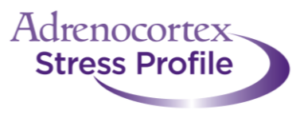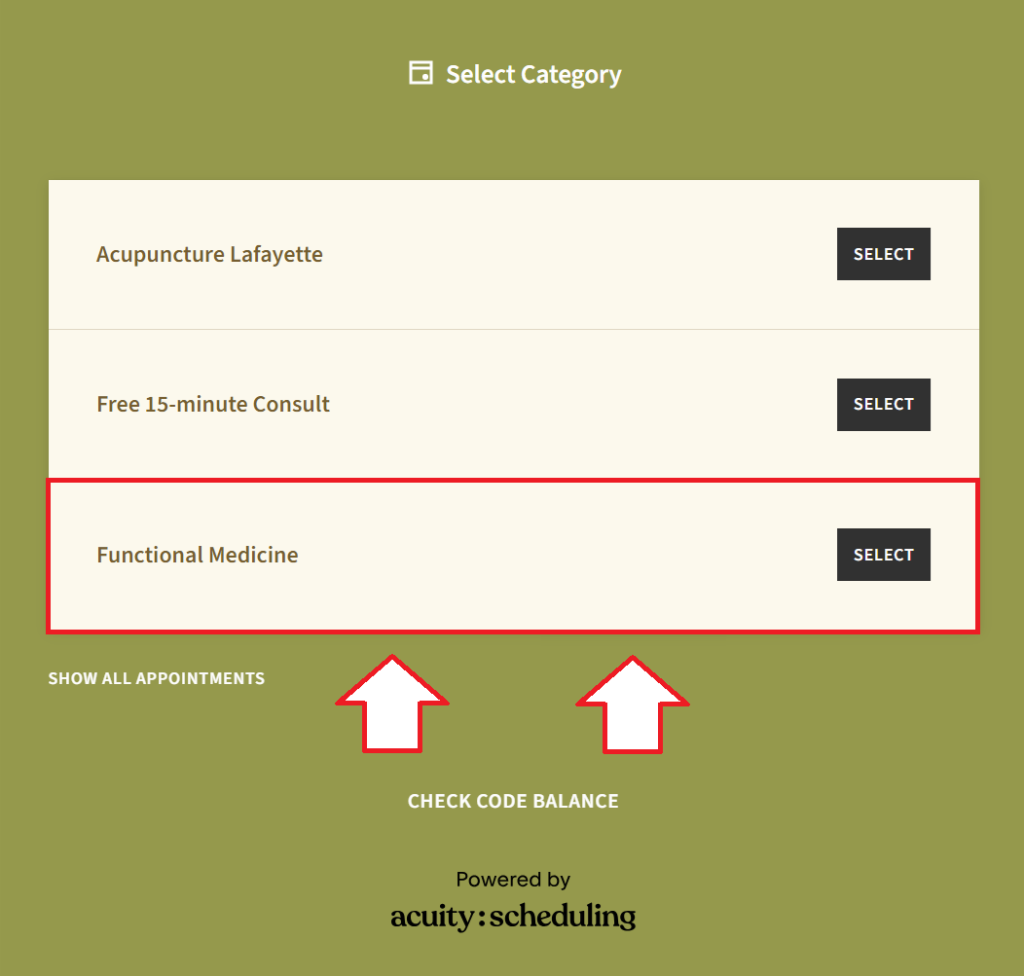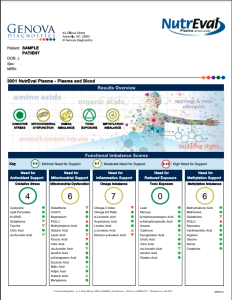Most importantly, Functional Medicine helps incorporate lifestyle changes into your life to restore health, balance, and vitality.
These include dietary changes, exercise, proper sleep hygiene, meditation, and other lifestyle adjustments.
Based on the patterns of data shown in lab results, nutritional supplements are also prescribed to support this change.
The goal of Functional Medicine is for you to improve your quality of life so that you can enjoy a higher quality of life and better fulfill your life’s mission.
While most people usually feel better within the first few weeks, the larger healing journey can take anywhere from 6 months to 2 years, depending on the complexity of your condition and how long you’ve had it.
Our goal is for you to feel healthy without an over-reliance on medications and supplements (some may be necessary), and instead utilize a good clean diet and lifestyle to maintain your optimum health.
After you complete your program, we suggest that you check in 1-2 times per year to help keep you on track, and do a periodic Organic Acids Test to make sure your body’s systems are functioning properly.
A program of treatment in Functional Medicine usually proceeds in the following manner:
Initial Visit You’ll first fill out a detailed Intake Form that we’ll review together at the first visit, via telemedicine or telephone. We will also ask more specific questions about your health history to help connect the dots of your health puzzle. During the visit you’ll receive dietary and lifestyle recommendations, and, based on your particular situation, possibly supplements. At the end of the session we’ll order 1-3 labs that will be shipped directly to you.
Functional Medicine Labs These lab tests can be performed at home and usually involve the collection of saliva, urine, or stool samples that are appropriately packaged and shipped via UPS or FEDEX. The results take 2-4 weeks to arrive, during which time you should usually be experiencing positive changes from the lifestyle adjustments you’ve already been implementing.
Follow-up Visits With the arrival of lab results, we will schedule time to discuss your labs, lifestyle changes, and nutritional supplements. We’ll send you a summary of the recommendations that we discussed, a supplement protocol that outlines your course of treatment for the next 6 to 12 months, and a supplement prescription from our online dispensary.
We will also schedule periodic Follow-up Visits (usually every month of two) to discuss progress on health issues, lifestyle changes, and supplements.
Of the hundreds of Functional Medicine labs available, we keep things simple by using a few key labs really well. Depending on your situation, there are different variations of these tests. They include:
- Adrenal Stress Labs,
- GI Stool Analysis, and
- Organic Acid Tests
Unlike other styles of Functional Medicine, we focus on minimizing the number of labs needed to identify health issues and establish a baseline for assessing improvement. Out of hundreds of available lab tests, patients usually end up doing 1-3 labs, depending on the complexity of their condition.
Unlike other styles of Functional Medicine, we focus on minimizing the number of labs needed to identify health issues and establish a baseline for assessing improvement. Out of hundreds of available lab tests, patients usually end up doing 1-3 labs, depending on the complexity of their condition.
We also seek to minimize the number of supplements that need to be taken at one time. While we aggressively go after pathogens and patterns of imbalance, we use a slower gentler approach to tonify and coax our body’s systems back into gear and healthy levels of function. Generally speaking with regards to supplement intake in Functional Medicine, we try not to prescribe more than 10 capsules being taken at one time.
The time to complete a program in Functional Medicine usually takes 6-12 months, depending of course on the individual patient’s condition, and their willingness and ability to stick with the program.
Of the hundreds of Functional Medicine labs available, we keep things simple by using a few key labs really well. You will likely only need to do 1 to 3 lab tests for your treatment program. This efficiency is one of the most appealing aspects of the Kalish Method, as it reduces the time and expense that it takes for your body heal and rebalance.
There are 3 basic types of labs that we use: Hormonal Stress Markers, Digestive Stool Analysis, and Organic Acid Tests.
Adrenal stress labs assess the amount of stress your body has endured over the decades by measuring your daily fluctuations in cortisol (the stress hormone) and DHEA levels to assess the overall health of your HPA Axis (hypothalamus, pituitary, and adrenals).
If your HPA Axis is not balanced, it often throws off the rest of your endocrine system, so resetting the HPA Axis is usually one of the first things that we do. When it gets reset, you should feel more energy and the rest of your hormonal system should start to fall back into place.
An imbalanced HPA Axis often results in adrenal insufficiency, in which case you could be experiencing some of the following symptoms:
• Fatigue
• Loss of endurance
• Digestive problems
• Slow metabolism
• Weight gain
• Food cravings
• Blood sugar issues
• Brain fog
• Insomnia
• Hair loss (female)
• Loss of libido
We use three labs we for assessing the HPA Axis:
Adrenocortex Stress Profile (Genova Diagnostics - $195) is the least expensive and uses saliva collected in vials over the course of the day to measure daily fluctuations in cortisol and DHEA.

DUTCH Complete (Precision Analytics - $345) uses urine collected on filter paper over the course of a day and then air-dried. It also measures levels of progesterone, the 3 estrogens, testosterone, melatonin, and their breakdown products.

Rhythm Plus (Genova Diagnostics - $495), a saliva test that not only captures the levels of stress hormones over the course of a day, but also captures the levels and fluctuations of estrogen, and progesterone over the course of a month which is very helpful for assessing and treating various menstrual conditions. Hormonal imbalances such as unopposed estrogen, high follicular progesterone, anovulation and luteal phase defects are easily identified. This hormone test is especially useful in treatment of patients with chronic menstrual disorders.

Click here for a patient case study that utilizes an adrenal stress test.
These tests cover a variety of factors that influence digestive and overall gastrointestinal health. The gut lining is one of the first things to go when exposed to chronic stress, as the body cannibalizes it as an easy source of amino acids. This lowers gut immunity and leads to the buildup of pathogenic bacteria in the gut, which in turn further compromises gut integrity.
Eventually the intestines become permeable, and this allows for small pieces of protein to be absorbed into the bloodstream. This raises inflammation levels throughout the body and causes a variety of autoimmune reactions and unpleasant symptoms, including headaches, fatigue, depression, muscle pains, and achy joints.
GI Effects Comprehensive Stool Profile (Genova Diagnostics - $415, + H.Pylori add-on $30), This is the stool test of choice for optimizing gut health. Since 80% of our immune system lies in the gut, this test provides insights that help guide dietary and clinical interventions to optimize immune health. It measures markers related to digestion and absorption, gut immune health, inflammation, the microbiome, and identifies possible parasites and bacterial pathogens.
H. pylori add-on (+$30) Helicobacter pylori is an opportunistic pathogen that often shows up in times of stress, can cause a variety of unrelated symptoms (besides ulcers), is easily treatable, and we often recommend getting checked for it.

Over the course of a night, our urine collects over 1,000 unique organic acids that result from chemical reactions happening throughout our body. When we compare levels of these organic acids to those seen in healthy populations, we can identify unhealthy patterns of data manifesting from an unbalanced biochemical physiology.
Organix Comprehensive Profile (Genova Diagnostics - $395) This test picks 46 of these organic acids from a sample of frozen urine to assess a wide range of body systems, providing us with a detailed overview of our health status. These include markers related to:
This is a complex test that offers lots of insight into how well your body’s systems are functioning. Researchers are still discovering new ways of interpreting the data it provides. If you were to do one test a year to track how your body’s systems are doing, this would be the one, as we can compare it to previous years to see how our physiology is trending.
Most importantly, the patterns identified in the Organix Comprehensive offer a clear roadmap of dietary, lifestyle, and supplement protocols that will lead you back to balance and health.

There is a wide range of Functional Medicine practiced by various practitioners. For some it evolved from their Naturopathic Medicine training. Others, including MDs, DOs, NPs, DCs, and LAcs, have done anywhere from a weekend course to the very well known IFM (Institute Functional Medicine) certification program (six 3-day weekend classes plus written case studies). I went with the Kalish Institute of Functional Medicine because it focuses on:
Another thing I liked about the Kalish program is that it really focuses on a few key functional medical labs out of the hundreds of labs that are available. By learning how to use these few labs really well, it's easier to get a clearer, deeper clinical impression of the patient vs. getting overwhelmed with too much information from the wide variety of labs that are out there.
These labs include:
Hormone labs focusing on the HPA Axis, including the DUTCH Test, Genova Adrenal Stress Profile, and HUMAP. Using info from these labs, I've learned some really amazing protocols using low-dose bio-identical hormone drops along with herbal therapies that address specific enzyme dysfunction to treat hormone imbalances. This helps to simulate a more normal functioning endocrine system and induces the brain and body to behave in a normal manner that continues on its own after the treatments are discontinued at 6 months or so.
Another hormone lab I use is the Genova Rhythm, which measures estrogen & progesterone levels at different times during the menstrual cycle. This lab is not used that frequently by other practitioners, but can be very helpful for identifying and treating various menstrual cycle related disorders, including migraines, bleeding, infertility, and digestive problems.
Digestive stool labs - these range from PCR based labs that look for pieces of DNA of various friendly, unfriendly, pathogenic, and parasitic 'bugs' that make up our microbiome, to direct microscopic identification of parasites and bacteria. Most functional medicine providers use these labs as part of their patient assessment. These days we use the GI Map, a well designed, reasonably priced PCR based lab.
If needed, we can take it one step further with another lab that is not as well known, parawellnessresearch.com, run by a Vietnam veteran pathologist who has seen everything under the sun, and often finds parasites that other labs miss.
In terms of treating gut issues, one of the strengths of our approach that we first address the long term effects of stress on the body's energy by running the hormone labs outlined above and treating deficiencies. This increases the body's energy, making it stronger and more able to take on pathogenic bacteria and parasites in the gut, and restore a healthy microbiome and immune system.
Organic acids tests - these are complicated labs that measure key organic acids involved in important biochemical reactions. Initially developed in the 1950s to assess amino acid processing viability in infants, they are now used with adults to assess overall biochemical functionality, genetic snips that can affect enzyme efficiency, and nutritional status. These include markers for:
Organic acids are complex, and new interpretations are still being developed. My teacher, Dan Kalish, DC, has 30+ years of practice experience and continues to study with Richard Lord, PhD, the original developer of the Genova Organix Profile.
Over the last 30 years, Dr. Kalish has studied and practiced with many of the pioneers in the field of functional medicine, developing lab interpretation and effective dietary, lifestyle, and supplement protocols that have evolved from years of trial and error. As a result, I’ve learned a highly refined and effective system of Functional Medicine that I get to share with you!
A program of treatment in Functional Medicine typically proceeds in the following manner:
Initial Visit
You’ll first fill out a detailed Intake Form that we’ll review together at the first visit, via telemedicine or telephone. We will also ask more specific questions about your health history to help connect the dots of your health puzzle. During the visit you’ll receive dietary and lifestyle recommendations, and, based on your particular situation, possibly supplements such as a 2-week detox program to help get your body ready for the upcoming changes. At the end of the session we’ll order 1-3 lab tests that will be shipped directly to you.
Functional Medicine Labs
These lab tests can be performed at home and usually involve the collection of saliva, urine, or stool samples that are you package and ship via UPS or Fedex. If there is a blood draw, you would need to schedule an appointment with a phlebotomist. The results take 2-4 weeks to arrive, during which time you should usually be experiencing positive changes from the lifestyle adjustments you’ve already been implementing.
Follow-up Visits
With the arrival of lab results, we will schedule time to discuss your labs, lifestyle changes, and nutritional supplements. We’ll send you a summary of the recommendations that we discussed, a supplement protocol that outlines your course of treatment for the next 6 to 12 months, and a supplement requisition from our online dispensary.
We will also schedule periodic Follow-up Visits (every month or so) to discuss progress on health issues, lifestyle changes, and supplements.
Functional Medicine Costs - General Overview
Functional Medicine Treatment Packages
6-Month Plan: Includes initial consultation plus 6 follow up consultations, initial 2 week detox program, adrenal stress test, GI stool test, and organic acid test. Based on lab results and your symptoms, we’ll come up with a 6 month plan for preserving / restoring your health. We’ll meet once per month to discuss the plan, your progress, and we’ll make adjustments as we go.
Cost = $2295 – this covers the cost of the lab tests (using the Organic Acids Profile), and consults, but does not cover the cost of supplements. Call 925-297-4785 for a free 15- minute consultation to see if we are the right fit for each other.
Supplements: Approximately $250-425/month, depending on complexity.
Additional 6-Month Plan: Includes 6 follow up patient consults. Any additional lab tests would be paid for separately.
Cost = $1195
Supplements: Approximately $250-425/month, depending on complexity.Functional Medicine a la Carte
Consultations: $296/hour
Lab tests:
- HPA Axis & Hormones Labs: $195-$305
- GI Stool Tests: $425
- Organic Acids Tests: $285-$585
Functional Medicine Costs – The Details
Consultations - $296/hour
These are broken down in 15-minute increments. Generally speaking, initial consultations take longer, along with explaining the lab results and treatment plan. Follow up consultations should take less time.
Functional Medicine Lab Costs
The lab costs above reflect the wholesale cost plus a $50-100 fee for a lab review that includes supplement recommendations. If you bring in your own labs, or you use your health insurance to pay for part of the labs, you will be charged an additional $50-100 fee for lab review, depending on the complexity of the lab.
Some labs will require an ICD9 diagnosis code. Some of the more commonly used codes that may work for functional lab tests include the following:
Stress Hormones & Adrenal Insufficiency Labs
- R53.83 Other fatigue
- E34.9 Endocrine disorder, unspecified
- E03.9 Hypothyroidism, unspecified
- R53.82 Chronic Fatigue, Unspecified
- G47.00 Insomnia, unspecified
- N95.1 Menopausal and Female Climacteric States
- R63.5 Abnormal Weight Gain
- R68.82 Decreased Libido
- R19.7 Diarrhea, Unspecified
- K58.0 Irritable Bowel Syndrome with Diarrhea
- K58.9 Irritable Bowel Syndrome without Diarrhea
- R10.9 Unspecified Abdominal Pain
- R14.0 Abdominal Distension (Gaseous)
- K59.00 Constipation, Unspecified
- R14.1 Gas Pain
- K52.89 Other Specified Noninfective Gastroenteritis and Colitis
- K52.29 Other Allergic and Dietetic Gastroenteritis and Colitis
- R 14.3 Flatulence
- R53.81 Other Malaise
- R53.83 Other Fatigue
- F41.9 Anxiety Disorder, Unspecified
- L30.9 Dermatitis, Unspecified
- G47.9 Sleep Disorder, Unspecified
- E61.9 Deficiency of Nutrient Element, Unspecified
- E63.9 Nutritional Deficiency, Unspecified
- L27.2 Dermatitis Due to Ingested Food
- R53.82 Chronic Fatigue, Unspecified
- L30.9 Dermatitis, Unspecified
- G47.9 Sleep Disorder, Unspecified
 (925) 297-4785
(925) 297-4785

